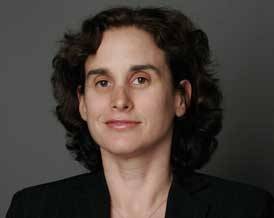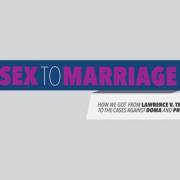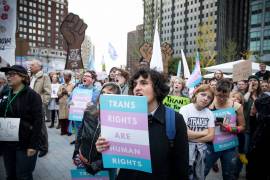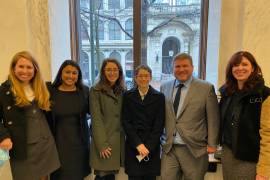
From Sex to Marriage: Opening the Door to Legal Victories
Blog Search
In the blog series From Sex to Marriage: How We Got From Lawrence v. Texas to the Cases Against DOMA and Prop 8, we ask key players in Lambda Legal’s biggest victory to discuss the importance of the landmark case, and its impact on the marriage cases currently before the Supreme Court.
The day it issued Lawrence v. Texas, the U.S. Supreme Court swept clear legal doctrines that had blocked progress to allow lesbian, gay and bisexual individuals to serve openly in the military, to enter into civil marriage, and to be free of discrimination in many other aspects of life. Of course, that same day we did not see universal compliance throughout the United States with the letter and spirit of Lawrence; it continues to take time and ongoing work to bring Lawrence’s promise of liberty and equality to full fruition nationwide. Indeed, the state of Virginia continued to enforce its criminal statute flatly prohibiting all acts of sodomy in any context, until just this month a federal circuit court declared that statute unconstitutional on its face under Lawrence in the case MacDonald v. Moose, in which Lambda Legal filed a friend-of-the-court brief.
Before Lawrence, the sexual intimacy of lesbians and gay men could be criminalized and stamped “immoral” by the government. This was a large part of the justification for “Don’t Ask, Don’t Tell” and the exclusion of openly gay individuals from serving their country in the military. With Lawrence, courts, and ultimately the Congress that repealed the ban in 2011, recognized that gay people have a protected liberty right to be gay and to engage in sexual intimacy on the same terms that other members of the military may. In large part thanks to Lawrence, it finally came to pass that the government could not make a condition of service in the military hiding that you engage in the sexual intimacy the Supreme Court resoundingly said it is your right to share.It is also no coincidence that the first victory in a marriage case came just five months after Lawrence, in the Massachusetts Goodridge case, and has been heavily cited in every court decision since affirming the freedom to marry. Lawrence in a doctrinal sense said you cannot define a fundamental liberty right so narrowly as to say that only heterosexuals have a protected right to engage in that type of sex, or to get married. Lawrence made clear that the rights protected by the Constitution are universal and cannot be denied to a group because the majority dislikes that group. Lawrence was suffused with expressions of the equality that lesbian and gay people deserve and the dignity of their relationships. These principles have played out in marriage cases, and we hope will in the Supreme Court this term as well.
Indeed, Lawrence not only reflected a growing public acceptance of gay people, but also helped dramatically to advance that acceptance and understanding. In 2003, the nation saw the majority of the Supreme Court—whose members are mature, august jurists, hardly the avant garde of radicalism—very respectfully proclaim the basic humanity, dignity and rights of gay people, and acknowledge the wrong that had been done in and flowed from Bowers v. Hardwick, the 1986 case upholding sodomy laws. This was powerful stuff that raised rainbow flags, literally and figuratively, around the nation.
Next: Jon W. Davidson, Legal Director for Lambda Legal, explores how Lawrence got us where we are today, ready for the next landmark victory.
Previously:
- Lambda Legal Executive Director Kevin M. Cathcart introduces the series and the guest bloggers.
- Attorney Mitchell Katine recalls receiving the phone call that set the Lawrence case in motion.
- Ruth Harlow, former Legal Director for Lambda Legal, discusses our legal strategy on Lawrence.
- Roger Poindexter, Regional Director at Lambda Legal’s Dallas office, reflects on what it was like living in Texas before and after the historic decision.
- Hector Vargas, former Regional Director at Lambda Legal’s Atlanta office, discusses our community education strategy in the South regarding sodomy laws.
- Former Lambda Legal board member Paul M. Smith shares his experience arguing Lawrence before the Supreme Court.





